Legal Aspects of Business: Sole Trader to Director Duties
VerifiedAdded on 2020/01/28
|14
|3548
|427
Report
AI Summary
This report provides a comprehensive overview of the legal aspects of business, examining various business structures and the duties of company directors. It begins by defining and differentiating between sole traders, unlimited partnerships, and limited liability partnerships, outlining their characteristics, advantages, and disadvantages. The report then delves into the responsibilities of company directors, including acting within their powers, promoting the continuous growth of the organization, exercising independent judgment, and avoiding conflicts of interest. It emphasizes the importance of directors in decision-making, compliance with regulations, and the promotion of company success for the benefit of stakeholders. The report highlights key duties such as using powers effectively, maintaining customer and employee relations, making informed judgments, and fostering a positive working environment. Overall, the report offers valuable insights into the legal framework governing business operations and the critical role of directors in ensuring compliance and organizational success.
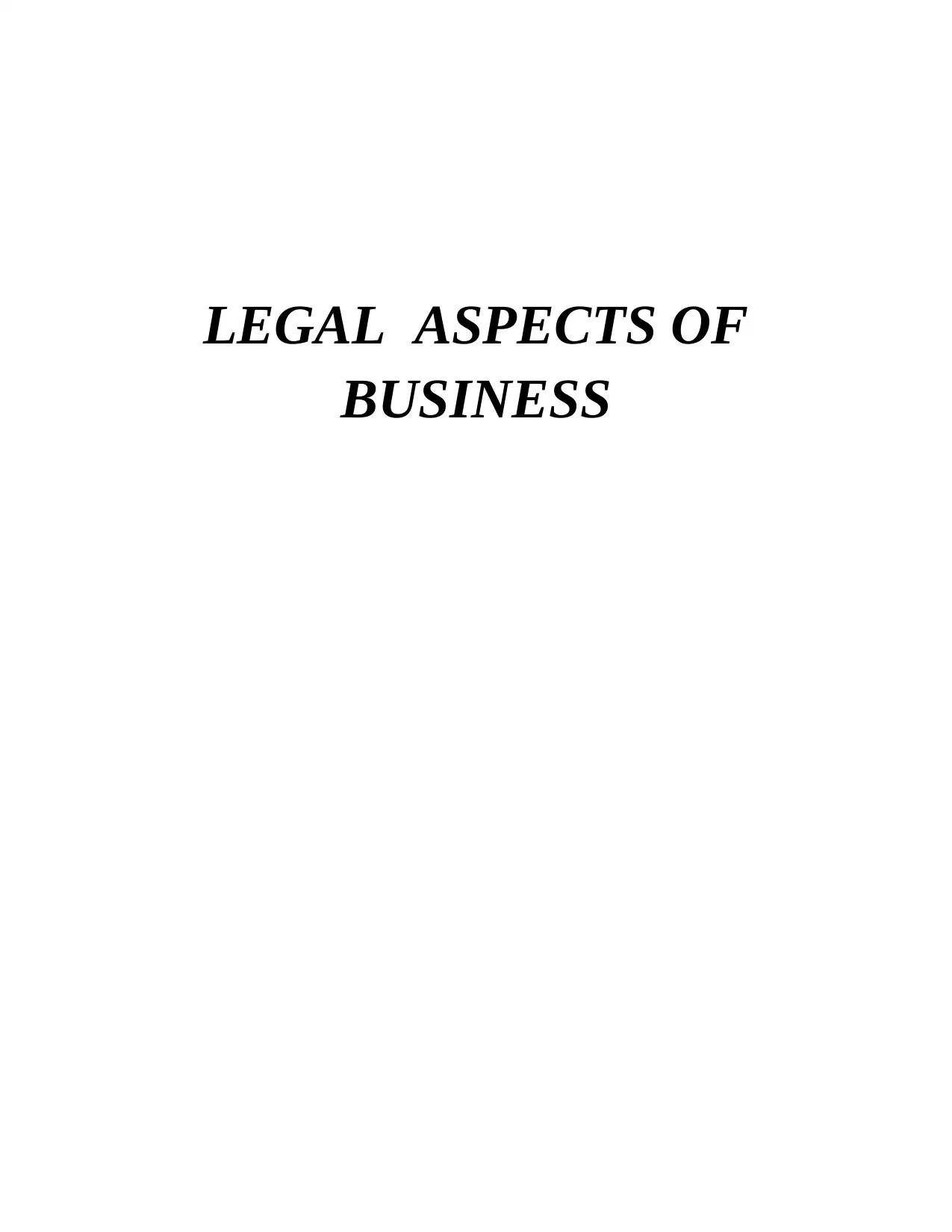
LEGAL ASPECTS OF
BUSINESS
BUSINESS
Paraphrase This Document
Need a fresh take? Get an instant paraphrase of this document with our AI Paraphraser
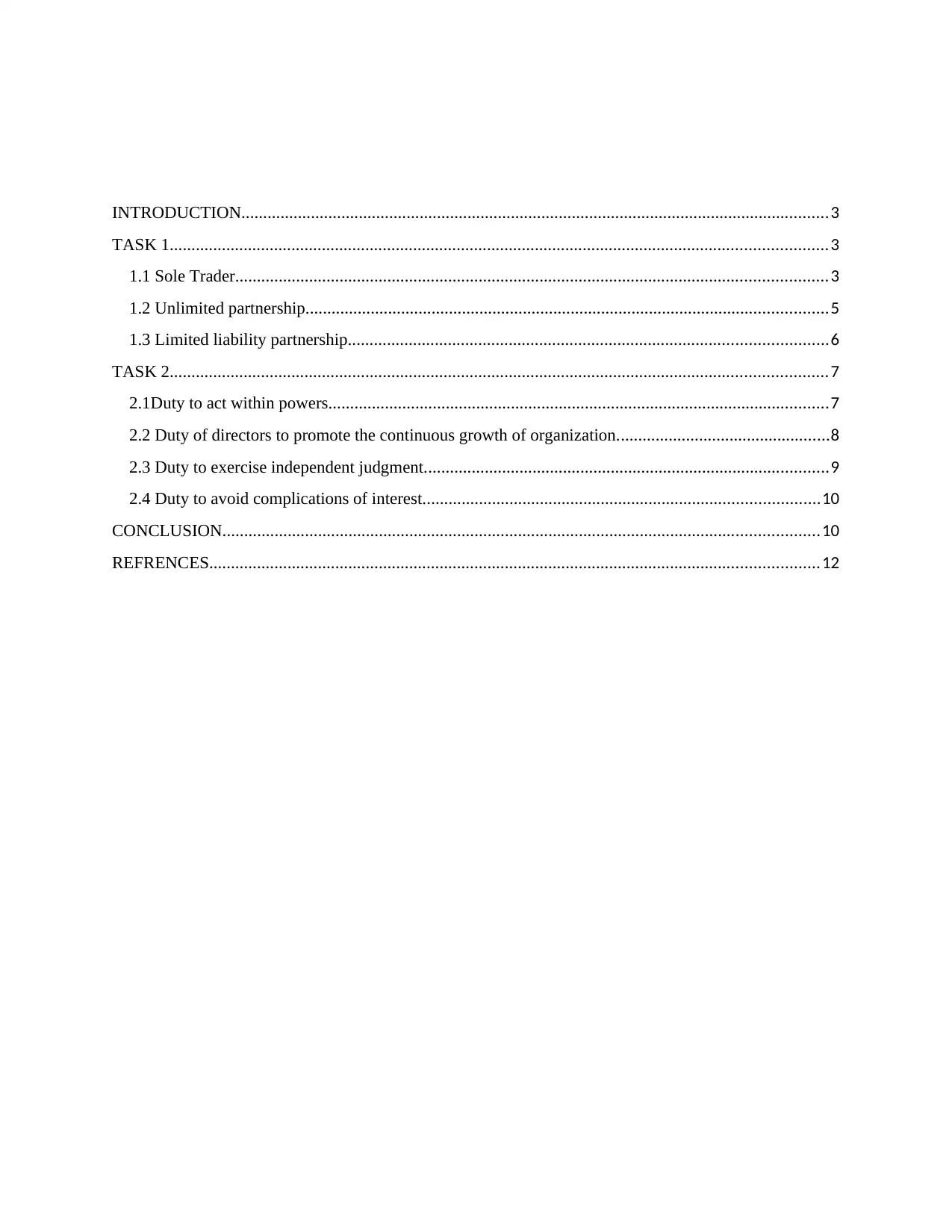
INTRODUCTION.......................................................................................................................................3
TASK 1.......................................................................................................................................................3
1.1 Sole Trader........................................................................................................................................3
1.2 Unlimited partnership........................................................................................................................5
1.3 Limited liability partnership..............................................................................................................6
TASK 2.......................................................................................................................................................7
2.1Duty to act within powers...................................................................................................................7
2.2 Duty of directors to promote the continuous growth of organization.................................................8
2.3 Duty to exercise independent judgment.............................................................................................9
2.4 Duty to avoid complications of interest...........................................................................................10
CONCLUSION.........................................................................................................................................10
REFRENCES............................................................................................................................................12
TASK 1.......................................................................................................................................................3
1.1 Sole Trader........................................................................................................................................3
1.2 Unlimited partnership........................................................................................................................5
1.3 Limited liability partnership..............................................................................................................6
TASK 2.......................................................................................................................................................7
2.1Duty to act within powers...................................................................................................................7
2.2 Duty of directors to promote the continuous growth of organization.................................................8
2.3 Duty to exercise independent judgment.............................................................................................9
2.4 Duty to avoid complications of interest...........................................................................................10
CONCLUSION.........................................................................................................................................10
REFRENCES............................................................................................................................................12
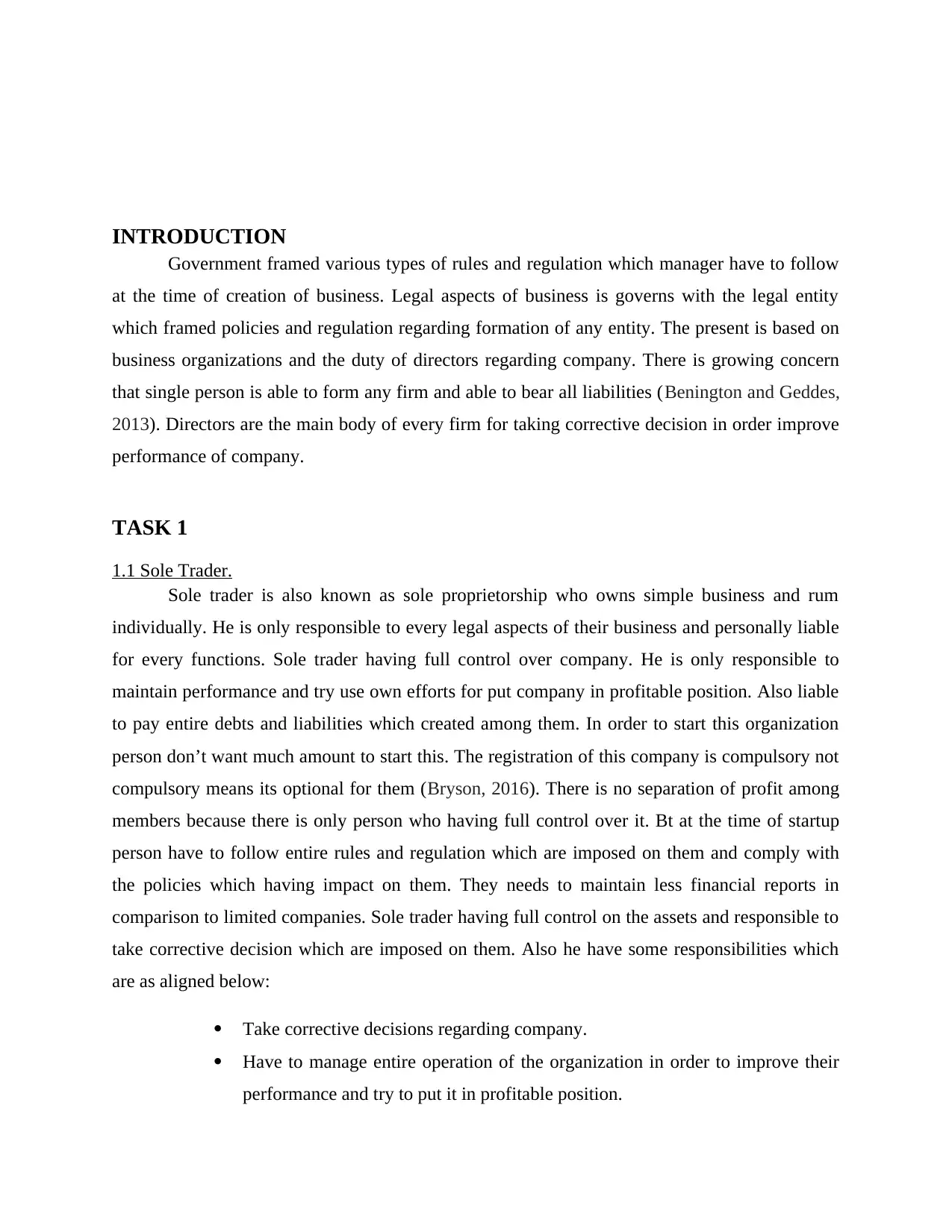
INTRODUCTION
Government framed various types of rules and regulation which manager have to follow
at the time of creation of business. Legal aspects of business is governs with the legal entity
which framed policies and regulation regarding formation of any entity. The present is based on
business organizations and the duty of directors regarding company. There is growing concern
that single person is able to form any firm and able to bear all liabilities (Benington and Geddes,
2013). Directors are the main body of every firm for taking corrective decision in order improve
performance of company.
TASK 1
1.1 Sole Trader.
Sole trader is also known as sole proprietorship who owns simple business and rum
individually. He is only responsible to every legal aspects of their business and personally liable
for every functions. Sole trader having full control over company. He is only responsible to
maintain performance and try use own efforts for put company in profitable position. Also liable
to pay entire debts and liabilities which created among them. In order to start this organization
person don’t want much amount to start this. The registration of this company is compulsory not
compulsory means its optional for them (Bryson, 2016). There is no separation of profit among
members because there is only person who having full control over it. Bt at the time of startup
person have to follow entire rules and regulation which are imposed on them and comply with
the policies which having impact on them. They needs to maintain less financial reports in
comparison to limited companies. Sole trader having full control on the assets and responsible to
take corrective decision which are imposed on them. Also he have some responsibilities which
are as aligned below:
Take corrective decisions regarding company.
Have to manage entire operation of the organization in order to improve their
performance and try to put it in profitable position.
Government framed various types of rules and regulation which manager have to follow
at the time of creation of business. Legal aspects of business is governs with the legal entity
which framed policies and regulation regarding formation of any entity. The present is based on
business organizations and the duty of directors regarding company. There is growing concern
that single person is able to form any firm and able to bear all liabilities (Benington and Geddes,
2013). Directors are the main body of every firm for taking corrective decision in order improve
performance of company.
TASK 1
1.1 Sole Trader.
Sole trader is also known as sole proprietorship who owns simple business and rum
individually. He is only responsible to every legal aspects of their business and personally liable
for every functions. Sole trader having full control over company. He is only responsible to
maintain performance and try use own efforts for put company in profitable position. Also liable
to pay entire debts and liabilities which created among them. In order to start this organization
person don’t want much amount to start this. The registration of this company is compulsory not
compulsory means its optional for them (Bryson, 2016). There is no separation of profit among
members because there is only person who having full control over it. Bt at the time of startup
person have to follow entire rules and regulation which are imposed on them and comply with
the policies which having impact on them. They needs to maintain less financial reports in
comparison to limited companies. Sole trader having full control on the assets and responsible to
take corrective decision which are imposed on them. Also he have some responsibilities which
are as aligned below:
Take corrective decisions regarding company.
Have to manage entire operation of the organization in order to improve their
performance and try to put it in profitable position.
⊘ This is a preview!⊘
Do you want full access?
Subscribe today to unlock all pages.

Trusted by 1+ million students worldwide
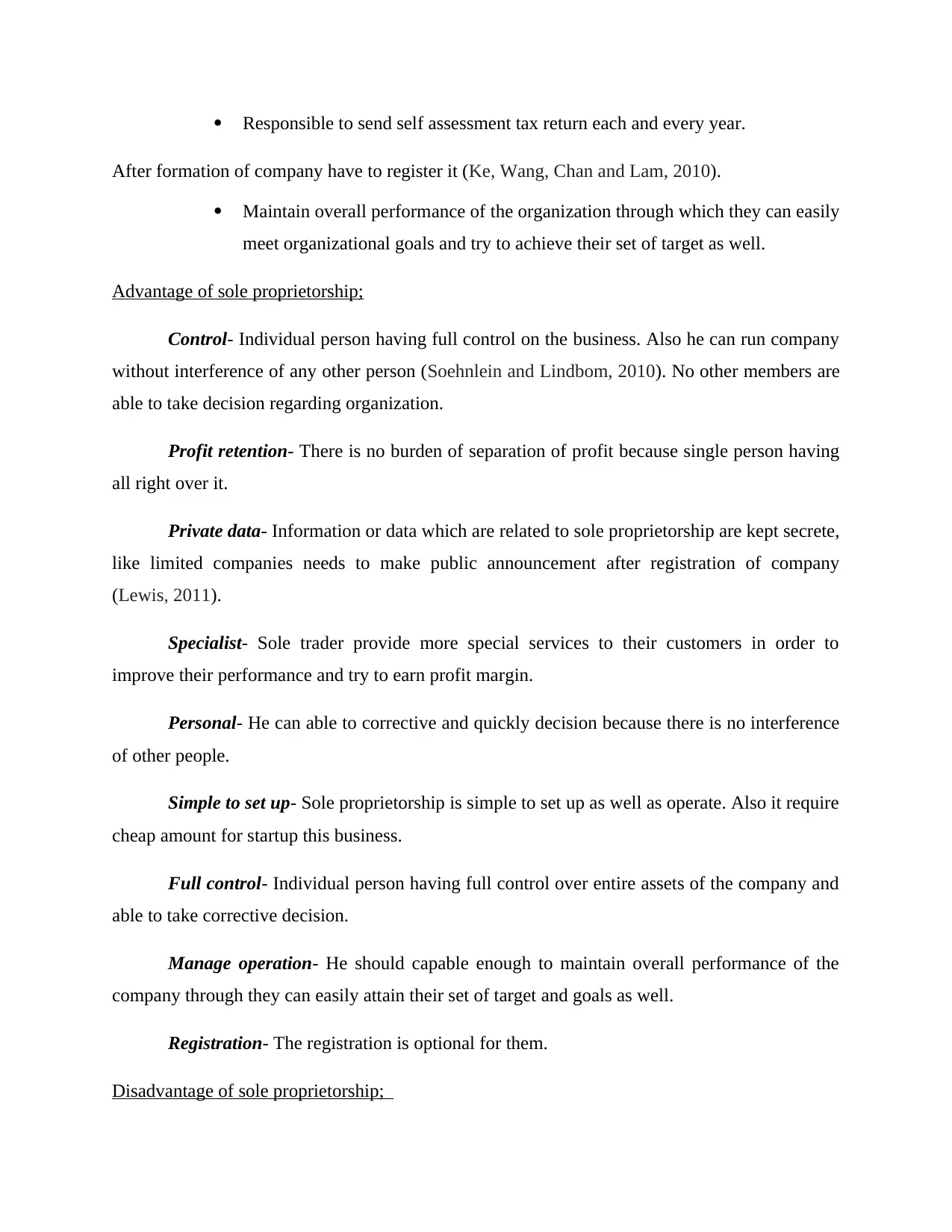
Responsible to send self assessment tax return each and every year.
After formation of company have to register it (Ke, Wang, Chan and Lam, 2010).
Maintain overall performance of the organization through which they can easily
meet organizational goals and try to achieve their set of target as well.
Advantage of sole proprietorship;
Control- Individual person having full control on the business. Also he can run company
without interference of any other person (Soehnlein and Lindbom, 2010). No other members are
able to take decision regarding organization.
Profit retention- There is no burden of separation of profit because single person having
all right over it.
Private data- Information or data which are related to sole proprietorship are kept secrete,
like limited companies needs to make public announcement after registration of company
(Lewis, 2011).
Specialist- Sole trader provide more special services to their customers in order to
improve their performance and try to earn profit margin.
Personal- He can able to corrective and quickly decision because there is no interference
of other people.
Simple to set up- Sole proprietorship is simple to set up as well as operate. Also it require
cheap amount for startup this business.
Full control- Individual person having full control over entire assets of the company and
able to take corrective decision.
Manage operation- He should capable enough to maintain overall performance of the
company through they can easily attain their set of target and goals as well.
Registration- The registration is optional for them.
Disadvantage of sole proprietorship;
After formation of company have to register it (Ke, Wang, Chan and Lam, 2010).
Maintain overall performance of the organization through which they can easily
meet organizational goals and try to achieve their set of target as well.
Advantage of sole proprietorship;
Control- Individual person having full control on the business. Also he can run company
without interference of any other person (Soehnlein and Lindbom, 2010). No other members are
able to take decision regarding organization.
Profit retention- There is no burden of separation of profit because single person having
all right over it.
Private data- Information or data which are related to sole proprietorship are kept secrete,
like limited companies needs to make public announcement after registration of company
(Lewis, 2011).
Specialist- Sole trader provide more special services to their customers in order to
improve their performance and try to earn profit margin.
Personal- He can able to corrective and quickly decision because there is no interference
of other people.
Simple to set up- Sole proprietorship is simple to set up as well as operate. Also it require
cheap amount for startup this business.
Full control- Individual person having full control over entire assets of the company and
able to take corrective decision.
Manage operation- He should capable enough to maintain overall performance of the
company through they can easily attain their set of target and goals as well.
Registration- The registration is optional for them.
Disadvantage of sole proprietorship;
Paraphrase This Document
Need a fresh take? Get an instant paraphrase of this document with our AI Paraphraser
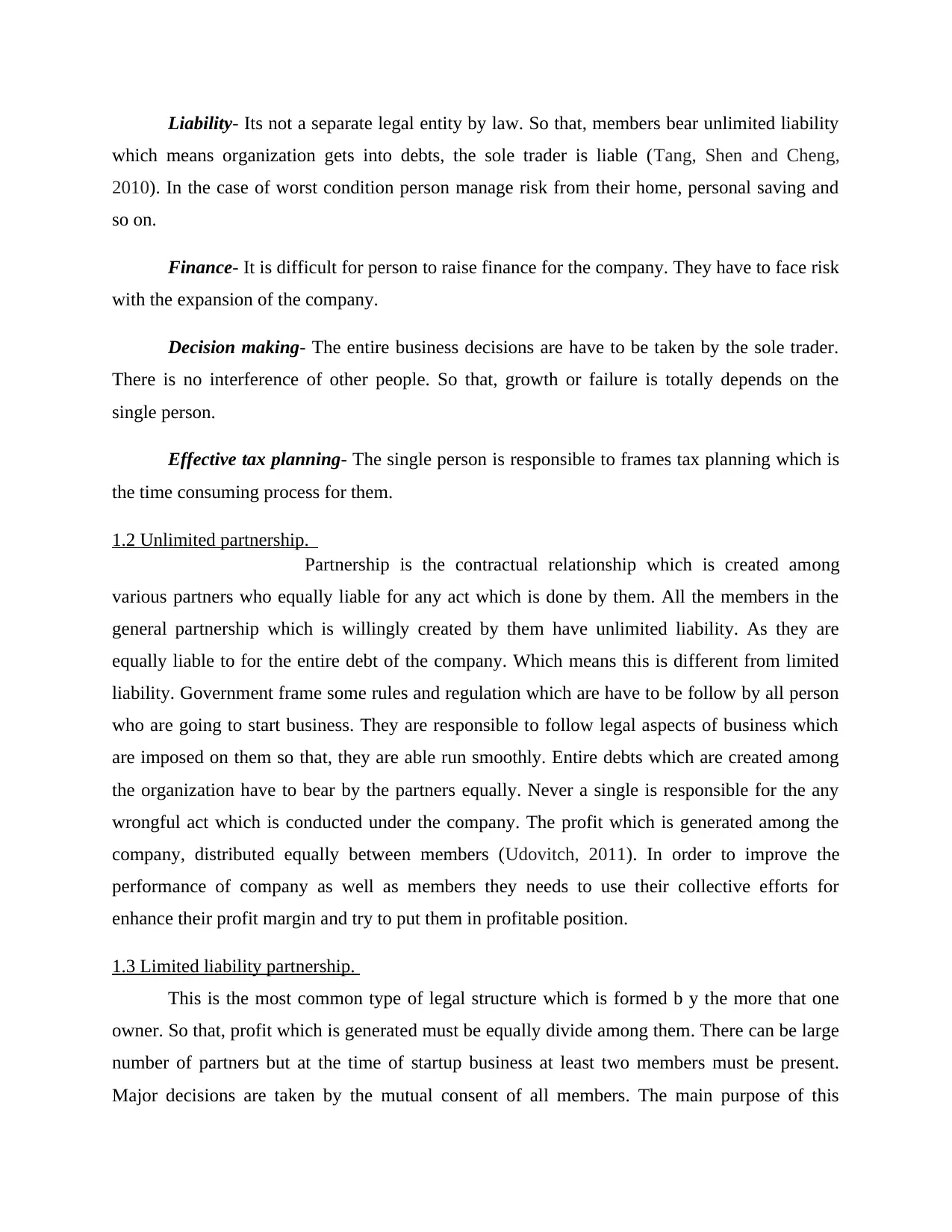
Liability- Its not a separate legal entity by law. So that, members bear unlimited liability
which means organization gets into debts, the sole trader is liable (Tang, Shen and Cheng,
2010). In the case of worst condition person manage risk from their home, personal saving and
so on.
Finance- It is difficult for person to raise finance for the company. They have to face risk
with the expansion of the company.
Decision making- The entire business decisions are have to be taken by the sole trader.
There is no interference of other people. So that, growth or failure is totally depends on the
single person.
Effective tax planning- The single person is responsible to frames tax planning which is
the time consuming process for them.
1.2 Unlimited partnership.
Partnership is the contractual relationship which is created among
various partners who equally liable for any act which is done by them. All the members in the
general partnership which is willingly created by them have unlimited liability. As they are
equally liable to for the entire debt of the company. Which means this is different from limited
liability. Government frame some rules and regulation which are have to be follow by all person
who are going to start business. They are responsible to follow legal aspects of business which
are imposed on them so that, they are able run smoothly. Entire debts which are created among
the organization have to bear by the partners equally. Never a single is responsible for the any
wrongful act which is conducted under the company. The profit which is generated among the
company, distributed equally between members (Udovitch, 2011). In order to improve the
performance of company as well as members they needs to use their collective efforts for
enhance their profit margin and try to put them in profitable position.
1.3 Limited liability partnership.
This is the most common type of legal structure which is formed b y the more that one
owner. So that, profit which is generated must be equally divide among them. There can be large
number of partners but at the time of startup business at least two members must be present.
Major decisions are taken by the mutual consent of all members. The main purpose of this
which means organization gets into debts, the sole trader is liable (Tang, Shen and Cheng,
2010). In the case of worst condition person manage risk from their home, personal saving and
so on.
Finance- It is difficult for person to raise finance for the company. They have to face risk
with the expansion of the company.
Decision making- The entire business decisions are have to be taken by the sole trader.
There is no interference of other people. So that, growth or failure is totally depends on the
single person.
Effective tax planning- The single person is responsible to frames tax planning which is
the time consuming process for them.
1.2 Unlimited partnership.
Partnership is the contractual relationship which is created among
various partners who equally liable for any act which is done by them. All the members in the
general partnership which is willingly created by them have unlimited liability. As they are
equally liable to for the entire debt of the company. Which means this is different from limited
liability. Government frame some rules and regulation which are have to be follow by all person
who are going to start business. They are responsible to follow legal aspects of business which
are imposed on them so that, they are able run smoothly. Entire debts which are created among
the organization have to bear by the partners equally. Never a single is responsible for the any
wrongful act which is conducted under the company. The profit which is generated among the
company, distributed equally between members (Udovitch, 2011). In order to improve the
performance of company as well as members they needs to use their collective efforts for
enhance their profit margin and try to put them in profitable position.
1.3 Limited liability partnership.
This is the most common type of legal structure which is formed b y the more that one
owner. So that, profit which is generated must be equally divide among them. There can be large
number of partners but at the time of startup business at least two members must be present.
Major decisions are taken by the mutual consent of all members. The main purpose of this
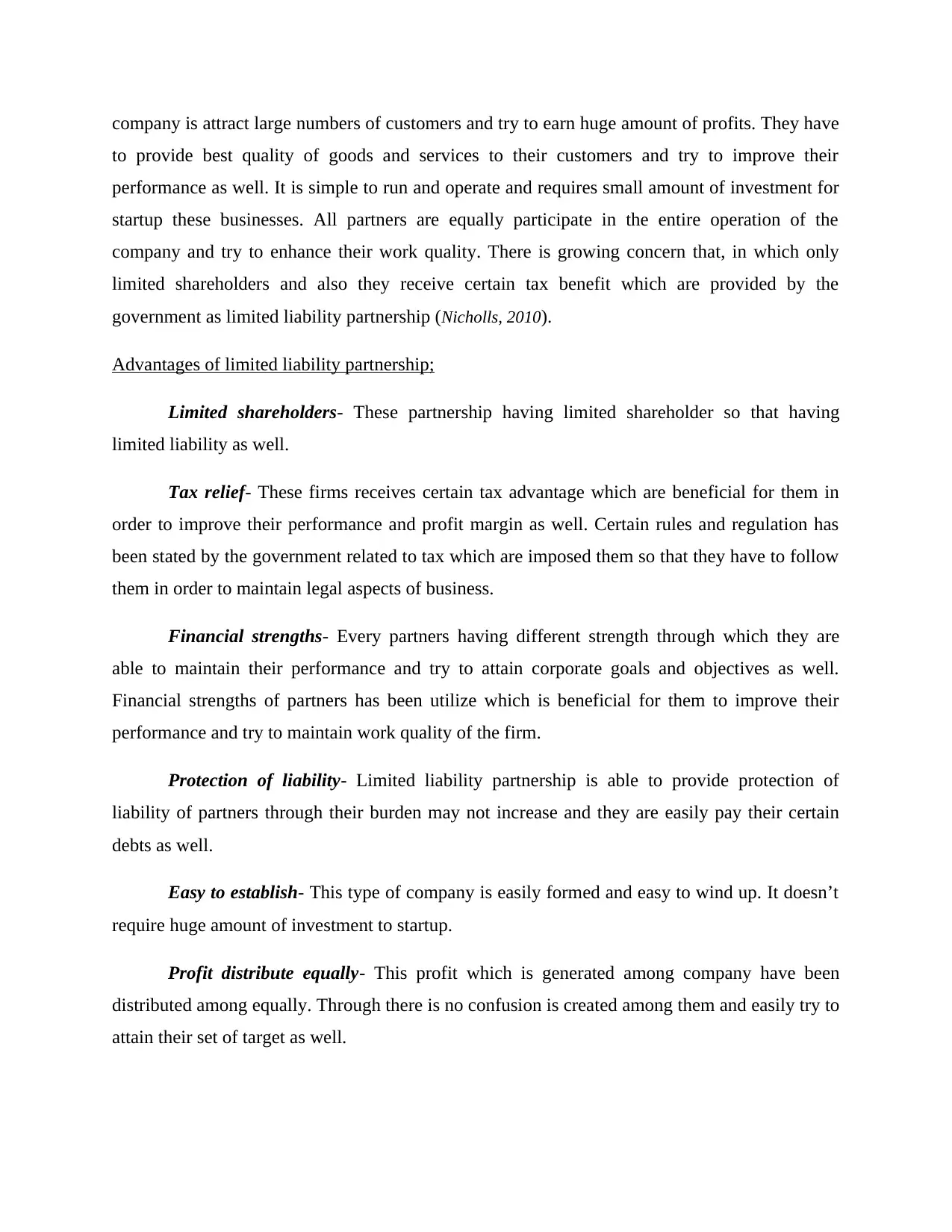
company is attract large numbers of customers and try to earn huge amount of profits. They have
to provide best quality of goods and services to their customers and try to improve their
performance as well. It is simple to run and operate and requires small amount of investment for
startup these businesses. All partners are equally participate in the entire operation of the
company and try to enhance their work quality. There is growing concern that, in which only
limited shareholders and also they receive certain tax benefit which are provided by the
government as limited liability partnership (Nicholls, 2010).
Advantages of limited liability partnership;
Limited shareholders- These partnership having limited shareholder so that having
limited liability as well.
Tax relief- These firms receives certain tax advantage which are beneficial for them in
order to improve their performance and profit margin as well. Certain rules and regulation has
been stated by the government related to tax which are imposed them so that they have to follow
them in order to maintain legal aspects of business.
Financial strengths- Every partners having different strength through which they are
able to maintain their performance and try to attain corporate goals and objectives as well.
Financial strengths of partners has been utilize which is beneficial for them to improve their
performance and try to maintain work quality of the firm.
Protection of liability- Limited liability partnership is able to provide protection of
liability of partners through their burden may not increase and they are easily pay their certain
debts as well.
Easy to establish- This type of company is easily formed and easy to wind up. It doesn’t
require huge amount of investment to startup.
Profit distribute equally- This profit which is generated among company have been
distributed among equally. Through there is no confusion is created among them and easily try to
attain their set of target as well.
to provide best quality of goods and services to their customers and try to improve their
performance as well. It is simple to run and operate and requires small amount of investment for
startup these businesses. All partners are equally participate in the entire operation of the
company and try to enhance their work quality. There is growing concern that, in which only
limited shareholders and also they receive certain tax benefit which are provided by the
government as limited liability partnership (Nicholls, 2010).
Advantages of limited liability partnership;
Limited shareholders- These partnership having limited shareholder so that having
limited liability as well.
Tax relief- These firms receives certain tax advantage which are beneficial for them in
order to improve their performance and profit margin as well. Certain rules and regulation has
been stated by the government related to tax which are imposed them so that they have to follow
them in order to maintain legal aspects of business.
Financial strengths- Every partners having different strength through which they are
able to maintain their performance and try to attain corporate goals and objectives as well.
Financial strengths of partners has been utilize which is beneficial for them to improve their
performance and try to maintain work quality of the firm.
Protection of liability- Limited liability partnership is able to provide protection of
liability of partners through their burden may not increase and they are easily pay their certain
debts as well.
Easy to establish- This type of company is easily formed and easy to wind up. It doesn’t
require huge amount of investment to startup.
Profit distribute equally- This profit which is generated among company have been
distributed among equally. Through there is no confusion is created among them and easily try to
attain their set of target as well.
⊘ This is a preview!⊘
Do you want full access?
Subscribe today to unlock all pages.

Trusted by 1+ million students worldwide
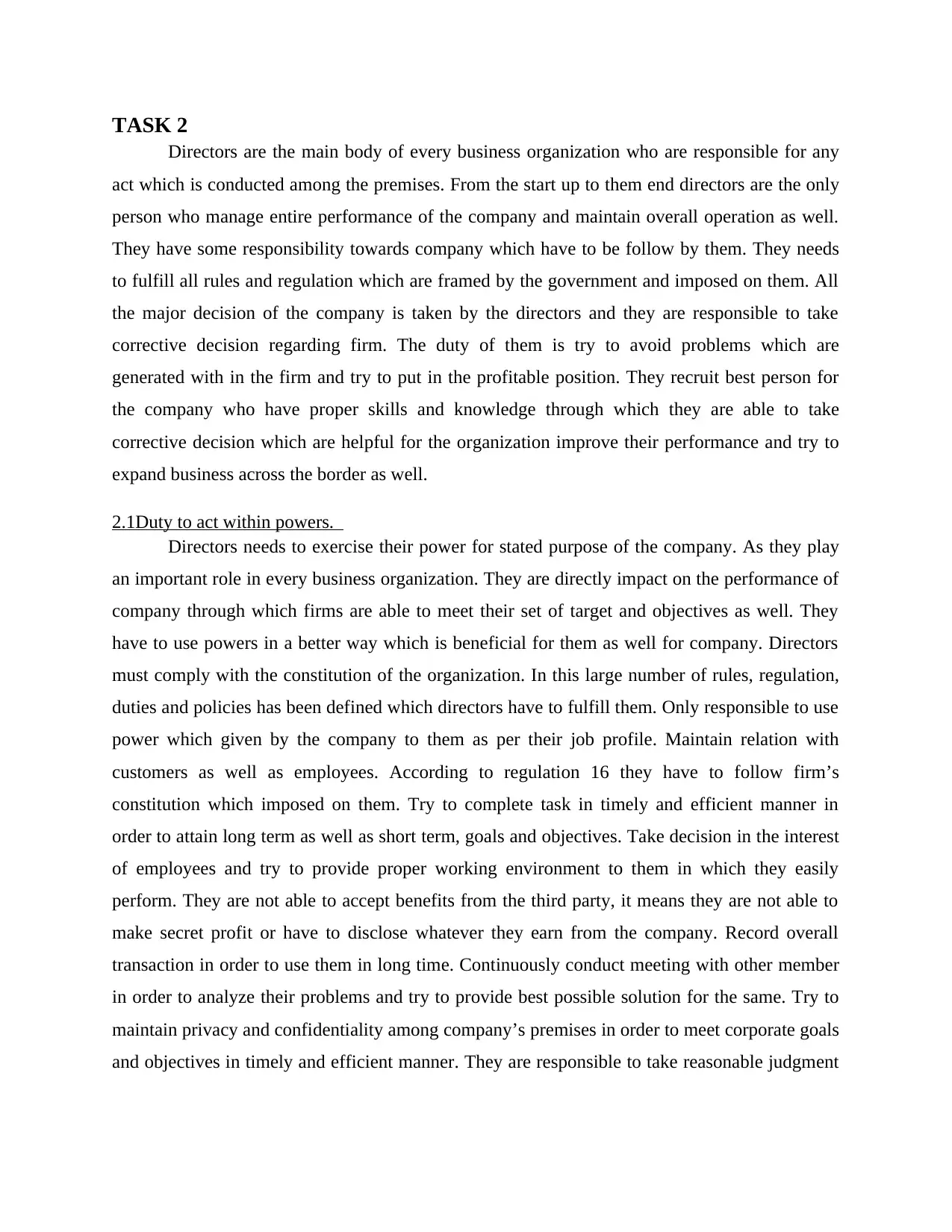
TASK 2
Directors are the main body of every business organization who are responsible for any
act which is conducted among the premises. From the start up to them end directors are the only
person who manage entire performance of the company and maintain overall operation as well.
They have some responsibility towards company which have to be follow by them. They needs
to fulfill all rules and regulation which are framed by the government and imposed on them. All
the major decision of the company is taken by the directors and they are responsible to take
corrective decision regarding firm. The duty of them is try to avoid problems which are
generated with in the firm and try to put in the profitable position. They recruit best person for
the company who have proper skills and knowledge through which they are able to take
corrective decision which are helpful for the organization improve their performance and try to
expand business across the border as well.
2.1Duty to act within powers.
Directors needs to exercise their power for stated purpose of the company. As they play
an important role in every business organization. They are directly impact on the performance of
company through which firms are able to meet their set of target and objectives as well. They
have to use powers in a better way which is beneficial for them as well for company. Directors
must comply with the constitution of the organization. In this large number of rules, regulation,
duties and policies has been defined which directors have to fulfill them. Only responsible to use
power which given by the company to them as per their job profile. Maintain relation with
customers as well as employees. According to regulation 16 they have to follow firm’s
constitution which imposed on them. Try to complete task in timely and efficient manner in
order to attain long term as well as short term, goals and objectives. Take decision in the interest
of employees and try to provide proper working environment to them in which they easily
perform. They are not able to accept benefits from the third party, it means they are not able to
make secret profit or have to disclose whatever they earn from the company. Record overall
transaction in order to use them in long time. Continuously conduct meeting with other member
in order to analyze their problems and try to provide best possible solution for the same. Try to
maintain privacy and confidentiality among company’s premises in order to meet corporate goals
and objectives in timely and efficient manner. They are responsible to take reasonable judgment
Directors are the main body of every business organization who are responsible for any
act which is conducted among the premises. From the start up to them end directors are the only
person who manage entire performance of the company and maintain overall operation as well.
They have some responsibility towards company which have to be follow by them. They needs
to fulfill all rules and regulation which are framed by the government and imposed on them. All
the major decision of the company is taken by the directors and they are responsible to take
corrective decision regarding firm. The duty of them is try to avoid problems which are
generated with in the firm and try to put in the profitable position. They recruit best person for
the company who have proper skills and knowledge through which they are able to take
corrective decision which are helpful for the organization improve their performance and try to
expand business across the border as well.
2.1Duty to act within powers.
Directors needs to exercise their power for stated purpose of the company. As they play
an important role in every business organization. They are directly impact on the performance of
company through which firms are able to meet their set of target and objectives as well. They
have to use powers in a better way which is beneficial for them as well for company. Directors
must comply with the constitution of the organization. In this large number of rules, regulation,
duties and policies has been defined which directors have to fulfill them. Only responsible to use
power which given by the company to them as per their job profile. Maintain relation with
customers as well as employees. According to regulation 16 they have to follow firm’s
constitution which imposed on them. Try to complete task in timely and efficient manner in
order to attain long term as well as short term, goals and objectives. Take decision in the interest
of employees and try to provide proper working environment to them in which they easily
perform. They are not able to accept benefits from the third party, it means they are not able to
make secret profit or have to disclose whatever they earn from the company. Record overall
transaction in order to use them in long time. Continuously conduct meeting with other member
in order to analyze their problems and try to provide best possible solution for the same. Try to
maintain privacy and confidentiality among company’s premises in order to meet corporate goals
and objectives in timely and efficient manner. They are responsible to take reasonable judgment
Paraphrase This Document
Need a fresh take? Get an instant paraphrase of this document with our AI Paraphraser
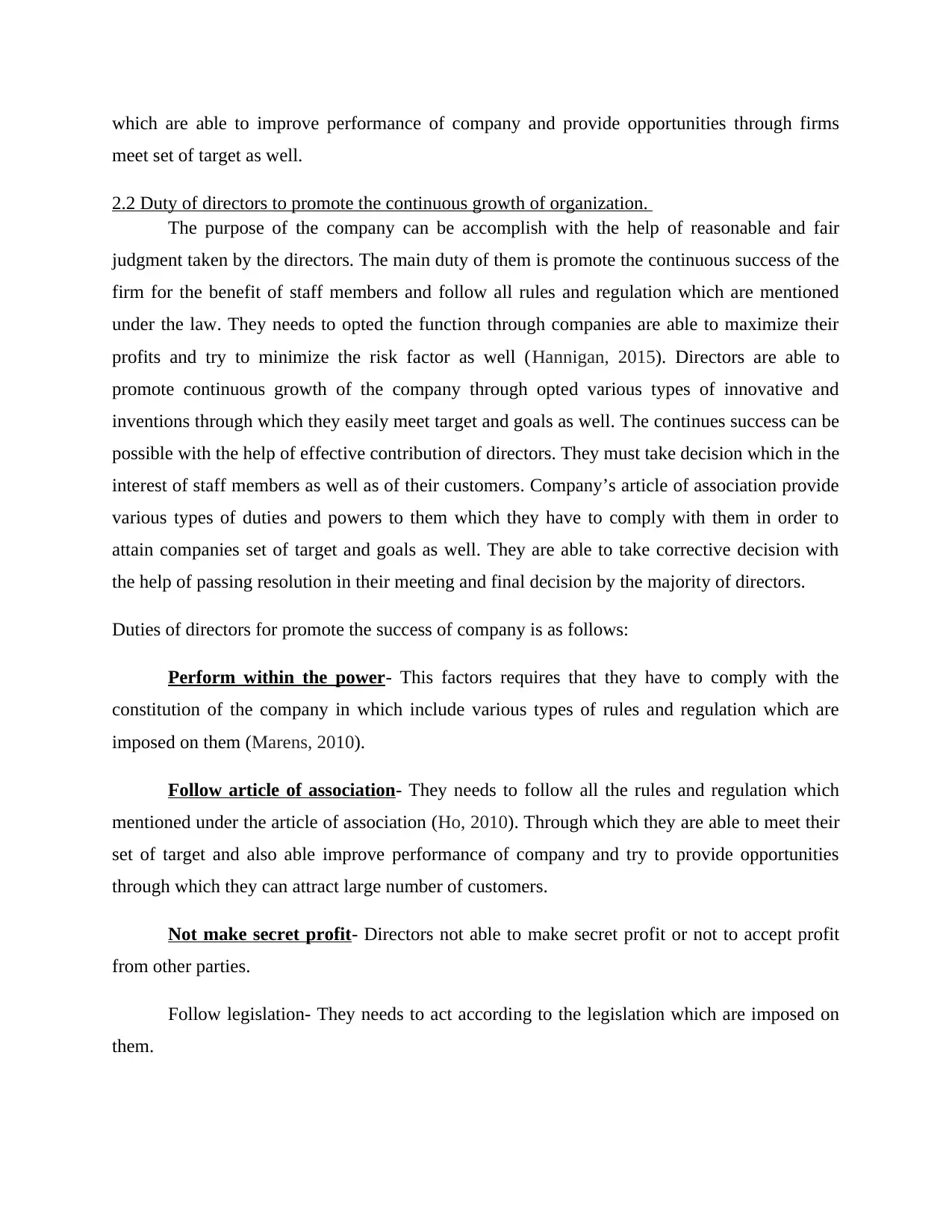
which are able to improve performance of company and provide opportunities through firms
meet set of target as well.
2.2 Duty of directors to promote the continuous growth of organization.
The purpose of the company can be accomplish with the help of reasonable and fair
judgment taken by the directors. The main duty of them is promote the continuous success of the
firm for the benefit of staff members and follow all rules and regulation which are mentioned
under the law. They needs to opted the function through companies are able to maximize their
profits and try to minimize the risk factor as well (Hannigan, 2015). Directors are able to
promote continuous growth of the company through opted various types of innovative and
inventions through which they easily meet target and goals as well. The continues success can be
possible with the help of effective contribution of directors. They must take decision which in the
interest of staff members as well as of their customers. Company’s article of association provide
various types of duties and powers to them which they have to comply with them in order to
attain companies set of target and goals as well. They are able to take corrective decision with
the help of passing resolution in their meeting and final decision by the majority of directors.
Duties of directors for promote the success of company is as follows:
Perform within the power- This factors requires that they have to comply with the
constitution of the company in which include various types of rules and regulation which are
imposed on them (Marens, 2010).
Follow article of association- They needs to follow all the rules and regulation which
mentioned under the article of association (Ho, 2010). Through which they are able to meet their
set of target and also able improve performance of company and try to provide opportunities
through which they can attract large number of customers.
Not make secret profit- Directors not able to make secret profit or not to accept profit
from other parties.
Follow legislation- They needs to act according to the legislation which are imposed on
them.
meet set of target as well.
2.2 Duty of directors to promote the continuous growth of organization.
The purpose of the company can be accomplish with the help of reasonable and fair
judgment taken by the directors. The main duty of them is promote the continuous success of the
firm for the benefit of staff members and follow all rules and regulation which are mentioned
under the law. They needs to opted the function through companies are able to maximize their
profits and try to minimize the risk factor as well (Hannigan, 2015). Directors are able to
promote continuous growth of the company through opted various types of innovative and
inventions through which they easily meet target and goals as well. The continues success can be
possible with the help of effective contribution of directors. They must take decision which in the
interest of staff members as well as of their customers. Company’s article of association provide
various types of duties and powers to them which they have to comply with them in order to
attain companies set of target and goals as well. They are able to take corrective decision with
the help of passing resolution in their meeting and final decision by the majority of directors.
Duties of directors for promote the success of company is as follows:
Perform within the power- This factors requires that they have to comply with the
constitution of the company in which include various types of rules and regulation which are
imposed on them (Marens, 2010).
Follow article of association- They needs to follow all the rules and regulation which
mentioned under the article of association (Ho, 2010). Through which they are able to meet their
set of target and also able improve performance of company and try to provide opportunities
through which they can attract large number of customers.
Not make secret profit- Directors not able to make secret profit or not to accept profit
from other parties.
Follow legislation- They needs to act according to the legislation which are imposed on
them.
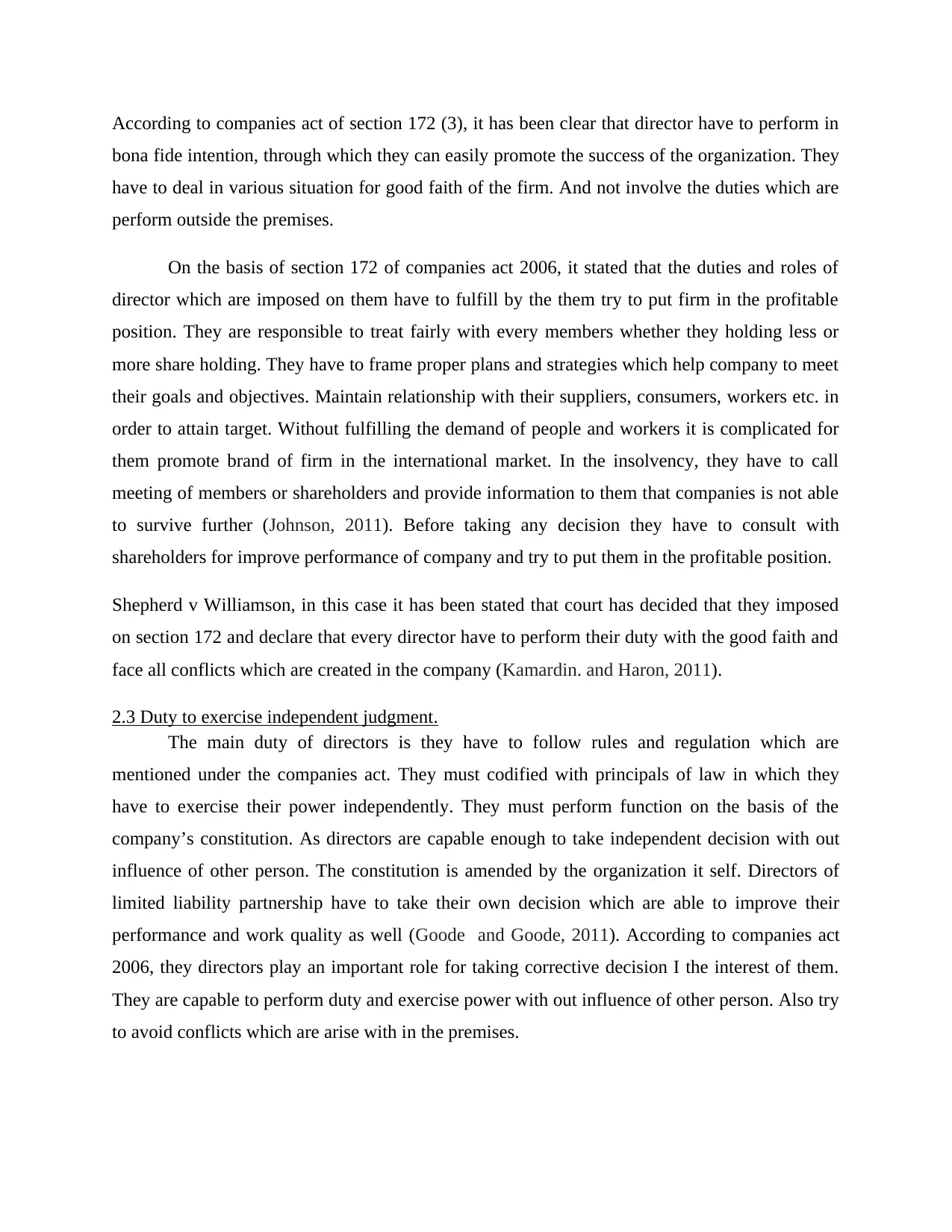
According to companies act of section 172 (3), it has been clear that director have to perform in
bona fide intention, through which they can easily promote the success of the organization. They
have to deal in various situation for good faith of the firm. And not involve the duties which are
perform outside the premises.
On the basis of section 172 of companies act 2006, it stated that the duties and roles of
director which are imposed on them have to fulfill by the them try to put firm in the profitable
position. They are responsible to treat fairly with every members whether they holding less or
more share holding. They have to frame proper plans and strategies which help company to meet
their goals and objectives. Maintain relationship with their suppliers, consumers, workers etc. in
order to attain target. Without fulfilling the demand of people and workers it is complicated for
them promote brand of firm in the international market. In the insolvency, they have to call
meeting of members or shareholders and provide information to them that companies is not able
to survive further (Johnson, 2011). Before taking any decision they have to consult with
shareholders for improve performance of company and try to put them in the profitable position.
Shepherd v Williamson, in this case it has been stated that court has decided that they imposed
on section 172 and declare that every director have to perform their duty with the good faith and
face all conflicts which are created in the company (Kamardin. and Haron, 2011).
2.3 Duty to exercise independent judgment.
The main duty of directors is they have to follow rules and regulation which are
mentioned under the companies act. They must codified with principals of law in which they
have to exercise their power independently. They must perform function on the basis of the
company’s constitution. As directors are capable enough to take independent decision with out
influence of other person. The constitution is amended by the organization it self. Directors of
limited liability partnership have to take their own decision which are able to improve their
performance and work quality as well (Goode and Goode, 2011). According to companies act
2006, they directors play an important role for taking corrective decision I the interest of them.
They are capable to perform duty and exercise power with out influence of other person. Also try
to avoid conflicts which are arise with in the premises.
bona fide intention, through which they can easily promote the success of the organization. They
have to deal in various situation for good faith of the firm. And not involve the duties which are
perform outside the premises.
On the basis of section 172 of companies act 2006, it stated that the duties and roles of
director which are imposed on them have to fulfill by the them try to put firm in the profitable
position. They are responsible to treat fairly with every members whether they holding less or
more share holding. They have to frame proper plans and strategies which help company to meet
their goals and objectives. Maintain relationship with their suppliers, consumers, workers etc. in
order to attain target. Without fulfilling the demand of people and workers it is complicated for
them promote brand of firm in the international market. In the insolvency, they have to call
meeting of members or shareholders and provide information to them that companies is not able
to survive further (Johnson, 2011). Before taking any decision they have to consult with
shareholders for improve performance of company and try to put them in the profitable position.
Shepherd v Williamson, in this case it has been stated that court has decided that they imposed
on section 172 and declare that every director have to perform their duty with the good faith and
face all conflicts which are created in the company (Kamardin. and Haron, 2011).
2.3 Duty to exercise independent judgment.
The main duty of directors is they have to follow rules and regulation which are
mentioned under the companies act. They must codified with principals of law in which they
have to exercise their power independently. They must perform function on the basis of the
company’s constitution. As directors are capable enough to take independent decision with out
influence of other person. The constitution is amended by the organization it self. Directors of
limited liability partnership have to take their own decision which are able to improve their
performance and work quality as well (Goode and Goode, 2011). According to companies act
2006, they directors play an important role for taking corrective decision I the interest of them.
They are capable to perform duty and exercise power with out influence of other person. Also try
to avoid conflicts which are arise with in the premises.
⊘ This is a preview!⊘
Do you want full access?
Subscribe today to unlock all pages.

Trusted by 1+ million students worldwide
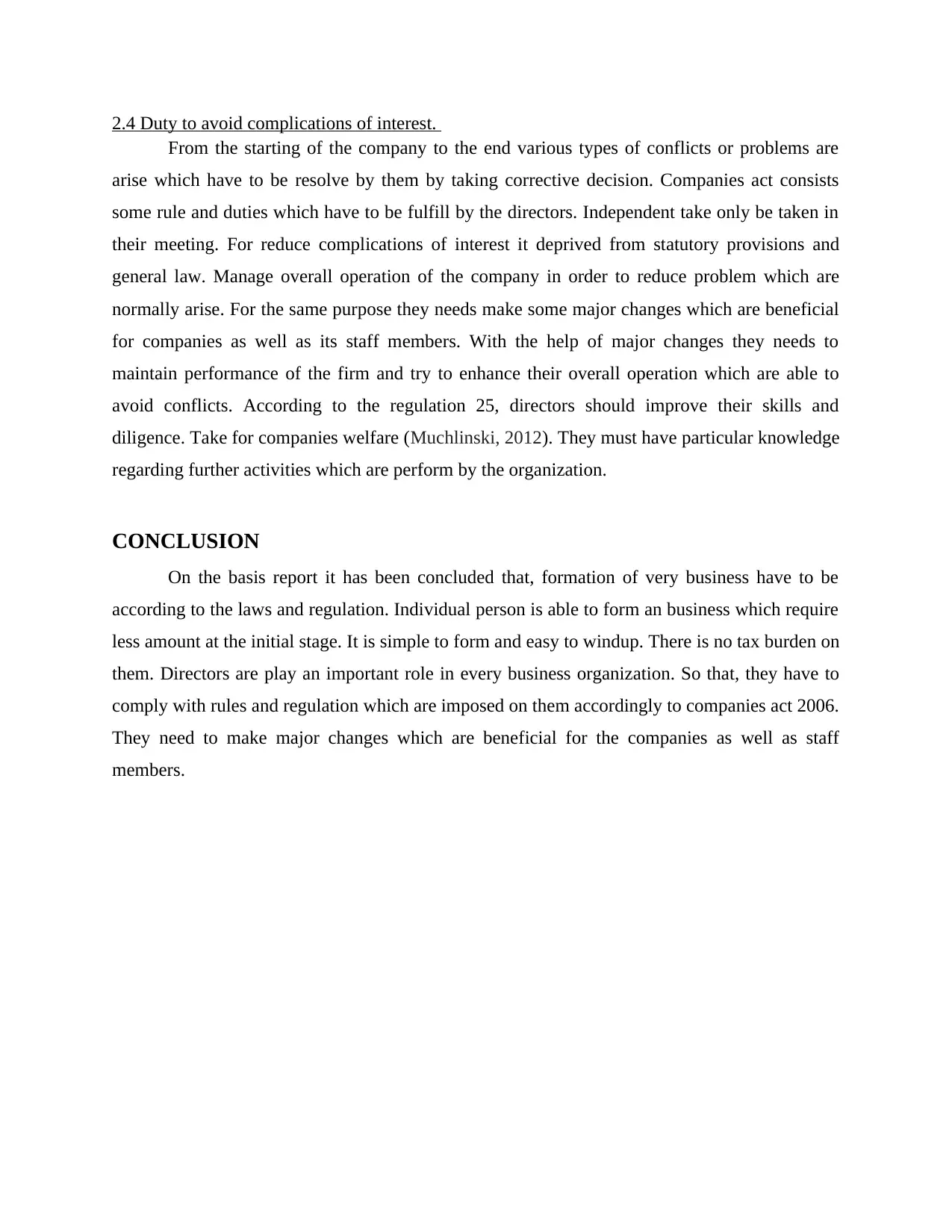
2.4 Duty to avoid complications of interest.
From the starting of the company to the end various types of conflicts or problems are
arise which have to be resolve by them by taking corrective decision. Companies act consists
some rule and duties which have to be fulfill by the directors. Independent take only be taken in
their meeting. For reduce complications of interest it deprived from statutory provisions and
general law. Manage overall operation of the company in order to reduce problem which are
normally arise. For the same purpose they needs make some major changes which are beneficial
for companies as well as its staff members. With the help of major changes they needs to
maintain performance of the firm and try to enhance their overall operation which are able to
avoid conflicts. According to the regulation 25, directors should improve their skills and
diligence. Take for companies welfare (Muchlinski, 2012). They must have particular knowledge
regarding further activities which are perform by the organization.
CONCLUSION
On the basis report it has been concluded that, formation of very business have to be
according to the laws and regulation. Individual person is able to form an business which require
less amount at the initial stage. It is simple to form and easy to windup. There is no tax burden on
them. Directors are play an important role in every business organization. So that, they have to
comply with rules and regulation which are imposed on them accordingly to companies act 2006.
They need to make major changes which are beneficial for the companies as well as staff
members.
From the starting of the company to the end various types of conflicts or problems are
arise which have to be resolve by them by taking corrective decision. Companies act consists
some rule and duties which have to be fulfill by the directors. Independent take only be taken in
their meeting. For reduce complications of interest it deprived from statutory provisions and
general law. Manage overall operation of the company in order to reduce problem which are
normally arise. For the same purpose they needs make some major changes which are beneficial
for companies as well as its staff members. With the help of major changes they needs to
maintain performance of the firm and try to enhance their overall operation which are able to
avoid conflicts. According to the regulation 25, directors should improve their skills and
diligence. Take for companies welfare (Muchlinski, 2012). They must have particular knowledge
regarding further activities which are perform by the organization.
CONCLUSION
On the basis report it has been concluded that, formation of very business have to be
according to the laws and regulation. Individual person is able to form an business which require
less amount at the initial stage. It is simple to form and easy to windup. There is no tax burden on
them. Directors are play an important role in every business organization. So that, they have to
comply with rules and regulation which are imposed on them accordingly to companies act 2006.
They need to make major changes which are beneficial for the companies as well as staff
members.
Paraphrase This Document
Need a fresh take? Get an instant paraphrase of this document with our AI Paraphraser


⊘ This is a preview!⊘
Do you want full access?
Subscribe today to unlock all pages.

Trusted by 1+ million students worldwide
1 out of 14
Related Documents
Your All-in-One AI-Powered Toolkit for Academic Success.
+13062052269
info@desklib.com
Available 24*7 on WhatsApp / Email
![[object Object]](/_next/static/media/star-bottom.7253800d.svg)
Unlock your academic potential
Copyright © 2020–2025 A2Z Services. All Rights Reserved. Developed and managed by ZUCOL.




